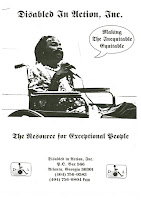A new program series hosted by the Richard B. Russell Library this April invites attendees to consider the powers and function of the U.S. Congress. Titled Civic Knowledge = Civic Power, the weekly program hosted from 12:30-1:30 p.m. looks to increase civic knowledge on campus and in the community with short lectures and informal discussion with speakers from UGA’s Department of Political Science.
The powers of the United States Congress are considerable and well established. Congress can collect taxes, coin money, declare war, raise and support armies and a navy, and make all laws necessary and proper to carry out its powers – just to name a few. But understanding Congress cannot be done in a vacuum or just through a listing of powers
The Richard B. Russell Library for Political Research and Studies, a center for research and study of the American political system, devised this series as a way to promote greater understanding at a time when surveys show declining levels of knowledge and confidence in Congress. “A 2016 survey conducted by the Annenberg Public Policy Center found that citizen knowledge of government basics is at a new low,” said outreach archivist Jan Hebbard. “At a time when many citizens seem increasingly interested in playing a more active role in politics, we wanted to create a space for informal learning about this branch of government and its history.” The series was also inspired by the annual Congress Week initiative, led by the Association of Centers for the Study of Congress.
At each event featured speakers will address a selected topic, beginning on April 4 with Dr. Anthony Madonna and Dr. Michael Lynch discussing how a bill becomes a law. Other topics on the schedule include Congress and the media; a short history of the filibuster; and uses of the executive order. Organizers hope addressing issues that have garnered widespread attention since the 2016 presidential election will engage people from both the campus and community. “We try to keep our programming connected both to our collections and to current events – helping people to draw connections between the past and present,” said Jill Severn, head of access and outreach for the Russell Library.
Partners for the series include the University of Georgia’s School of Public and International Affairs, the UGA College Republicans, and the UGA Young Democrats. A full listing of programs in the series can be found below. For more information contact russlib@uga.edu or call 706-542-5788.
The powers of the United States Congress are considerable and well established. Congress can collect taxes, coin money, declare war, raise and support armies and a navy, and make all laws necessary and proper to carry out its powers – just to name a few. But understanding Congress cannot be done in a vacuum or just through a listing of powers
The Richard B. Russell Library for Political Research and Studies, a center for research and study of the American political system, devised this series as a way to promote greater understanding at a time when surveys show declining levels of knowledge and confidence in Congress. “A 2016 survey conducted by the Annenberg Public Policy Center found that citizen knowledge of government basics is at a new low,” said outreach archivist Jan Hebbard. “At a time when many citizens seem increasingly interested in playing a more active role in politics, we wanted to create a space for informal learning about this branch of government and its history.” The series was also inspired by the annual Congress Week initiative, led by the Association of Centers for the Study of Congress.
At each event featured speakers will address a selected topic, beginning on April 4 with Dr. Anthony Madonna and Dr. Michael Lynch discussing how a bill becomes a law. Other topics on the schedule include Congress and the media; a short history of the filibuster; and uses of the executive order. Organizers hope addressing issues that have garnered widespread attention since the 2016 presidential election will engage people from both the campus and community. “We try to keep our programming connected both to our collections and to current events – helping people to draw connections between the past and present,” said Jill Severn, head of access and outreach for the Russell Library.
Partners for the series include the University of Georgia’s School of Public and International Affairs, the UGA College Republicans, and the UGA Young Democrats. A full listing of programs in the series can be found below. For more information contact russlib@uga.edu or call 706-542-5788.
Lunch & Learn Program, Topic: How a Bill Becomes a Law
Speakers: Dr. Anthony Madonna, Dr. Michael Lynch
Lunch & Learn Program, Topic: Congress and the Media: Shaping Public Perceptions
Speaker: Dr. Audrey Haynes
Lunch & Learn Program, Topic: A History of the Filibuster
Speaker: Dr. Anthony Madonna
Lunch & Learn Program, Topic: Use of the Executive Order
Speaker: Dr. Michael Lynch












